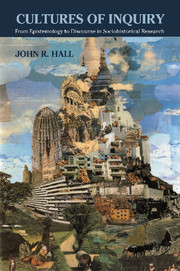Book contents
- Frontmatter
- Contents
- List of tables and figures
- Acknowledgments
- Prologue
- 1 Introduction: the Third Path
- PART I FORMATIVE DISCOURSES
- 2 Value discourse and the object of inquiry
- 3 Narrative cultures and inquiry
- 4 The conceptual possibilities of social theoretical discourse
- 5 The core of explanation and interpretation as formative discourse
- PART II PRACTICES OF INQUIRY
- Notes
- Bibliography
- Index
2 - Value discourse and the object of inquiry
Published online by Cambridge University Press: 22 September 2009
- Frontmatter
- Contents
- List of tables and figures
- Acknowledgments
- Prologue
- 1 Introduction: the Third Path
- PART I FORMATIVE DISCOURSES
- 2 Value discourse and the object of inquiry
- 3 Narrative cultures and inquiry
- 4 The conceptual possibilities of social theoretical discourse
- 5 The core of explanation and interpretation as formative discourse
- PART II PRACTICES OF INQUIRY
- Notes
- Bibliography
- Index
Summary
The topics of sociohistorical inquiry are not pre-formed things in the world itself. Instead, inquiry draws aspects of the world into focus through concepts like “industrialization,” “social movement,” “coup d'état,” and “citizenship.” It also proceeds by “colligating” – grouping together – “historical individuals” like “European feudalism,” “the Tai Ping rebellion,” “the Holocaust,” and “the US labor movement.” At the outset, we are best served by assuming that these organizing rubrics are not only historically saturated but also mediated by a welter of meaningful interests that shape inquiry. Conflicting preferences for one kind of knowledge over another, and assessments of their relative worth – in a word, values – shape the conduct of inquiry. Because the goal of a presuppositionless foundation of knowledge has proved elusive, at least initially, all “facts” about the world must be considered value- (or theory-) laden. And even if efforts to realize “objectivity” and “rational discourse” prove successful, they too embody value commitments – scientific ones that may crowd out others, such as emancipation, authenticity, and representation. Because competing ways of assessing inquiry's objects, purposes, and findings coexist, undertaking any research depends on a preparatory enterprise of clarifying the meaningful stakes of inquiry. This chapter describes that enterprise by considering what I call “the problem of values” – how contending discourses on ultimate purposes, goals, and routes to their realization frame the significance of an inquiry and its object, and in turn give meaning to, about, and from the sociohistorical world.
- Type
- Chapter
- Information
- Cultures of InquiryFrom Epistemology to Discourse in Sociohistorical Research, pp. 33 - 71Publisher: Cambridge University PressPrint publication year: 1999



